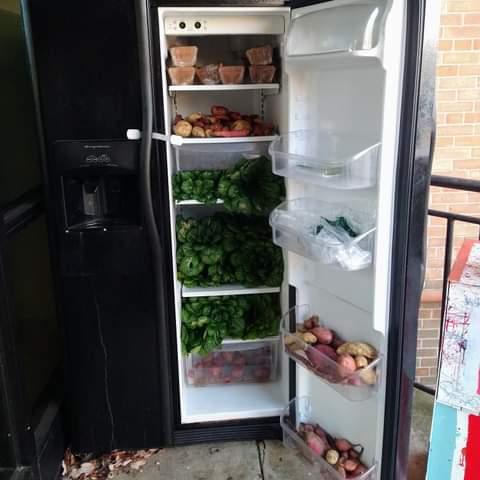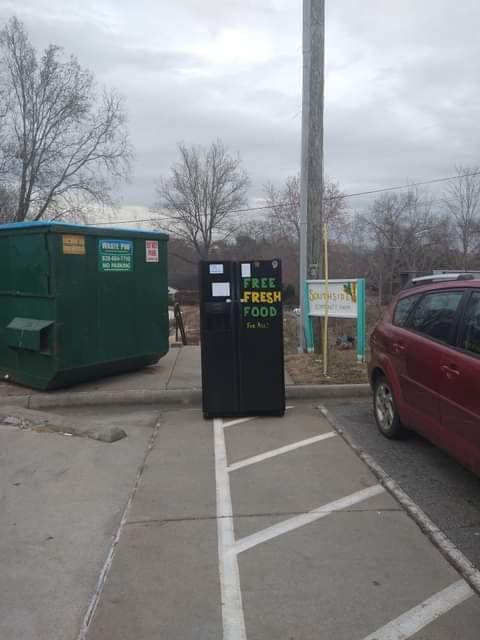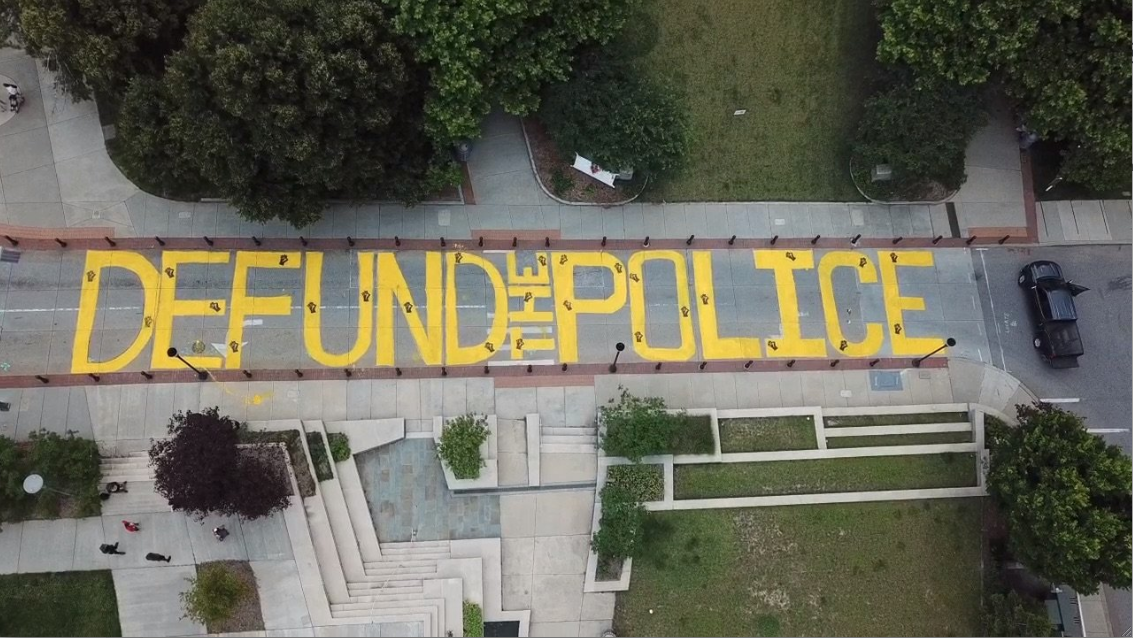


Asheville’s housing authority tosses out a free food fridge run by a local community farm group. It’s a shocking, revealing incident
Above: The free fridge at the Edington Center, stocked with fresh produce, before its removal. Photo courtesy of Southside Community Farms
Blade editor David Forbes contributed to this article
Last Thursday, without warning, the Housing Authority of the City of Asheville unplugged, moved and tried to throw away a free fridge that’s provided food for Southside residents for over three years.
The free fridge, operated at the Edington Center by Southside Community Farms, is a miniature food pantry that provides perishable food that is crucial to communities such as Southside. Hit hard by redlining and de facto segregation, the neighborhood is one of the city’s most glaring examples of food apartheid, where fresh, healthy food is nearly as scarce as community-controlled housing.
Southside Community Farm, a community group that has operated for nearly a decade, spoke to the Blade about the value of the fridge:
“Because the price of food has gone up drastically and COVID related assistance for oppressed communities (through EBT, etc) has more or less run dry, free, healthy food access is more important than ever,” they wrote. “To supplement the food we grow, Southside Community Farm has been spending $500 per week buying fresh food from BIPOC and local vendors to stock 2 neighborhood free fridges, and we’re running out of food pretty much every week, so there’s obviously a community need.”
HACA, the federally-backed agency that controls housing for over 3,000 overwhelmingly Black locals, has so far refused to provide them a reason for this decision. The farm believes the organization could blame the decision on children conducting food fights with the contents of the fridge.
“That happens,” Chloe, a farmer with the organization, said in an Instagram video. “This is an intergenerational community. It’s not the first time that’s happened. And it’s certainly more of an opportunity for accountability and discussions about food waste than it is a reason to remove an important community resource.”
The group has repeatedly linked fresh food and green space to healthy communities and collaborative healing for communities like Southside. The week before, in a fundraising post entitled “Support Real Public Safety,” the organization stated: “Public safety doesn’t mean overpolicing Black neighborhoods like Southside. It means making fresh, free food available to everyone.”
In a conversation with the Blade, the group emphasized that “real safety and wellness come through interconnected and accessible resources, not through policing or punitive action!”
The move comes weeks after Housing Authority CEO David Nash claimed, incredibly, that housing authority properties like Hillcrest Apartments were “under-policed.” In the last year, according to the police department’s own statistics, however, violent crimes in Asheville are down 10 percent, and property crimes are down 25 percent. Hillcrest itself has seen a substantial decline in crime over the past few years, as about half of Asheville’s patrol force has quit.

The Edington Center free fridge, after the housing authority unplugged and discarded it beside a dumpster without informing the group. Photo from Southside Community Farms
The community farmers don’t believe that the fridge will be allowed back in front of the Eddington Center, but does suggest that those contacting the housing authority keep their vulnerable position in mind.
“They are our landlord, like they are for many of the people who live in Southside.”
The fridge’s removal came during a fundraiser for the group.
“People have also been asking about volunteering and learning about the farm in general. We have a volunteer form and more info on our website, in our IG bio.”
Of course, those who depend on this free fridge must now find other ways to meet food needs. Southside Community Farm directs those with food needs to use the other free fridge at 382 South French Broad Ave. until they can find new storage area for the fridge the housing authority kicked to the curb.
“As we try to find a solution for the Edington Center fridge, the South French Broad fridge is still available for those who need food. They also accept high-quality food donations.”
‘There’s a lot of fear’
To those unfamiliar with the history of Asheville’s public housing, or HACA’s record over the decades, tossing out a fridge full of free food unannounced might seem shockingly wasteful and cruel. But the incident’s a revealing one that sadly lines up with many of the housing authority’s previous actions.
In the 50s, 60s and 70s the organization was a major player in the wave of “urban renewal” that devastated Black neighborhoods around the city, pushing many into public housing — or out of the city entirely when their homes and businesses were demolished.

A 1964 booklet from the Housing Authority of the City of Asheville, touting increased tax values from urban renewal. From UNCA, D. H. Ramsey Library Special Collections
By 1967 the complexes were in such disrepair that the predominantly Black residents of Hillcrest began a rent strike. Local elites joined with HACA’s management to try to intimidate the residents into compliance.
“Asheville is not the kind of community in which officials are likely to yield to organized pressure or the threat of pressure,” the Asheville Citizen newspaper declared in an editorial late that year.
But the strikers won, and as the strike grew HACA’s management was forced to resign and long overdue repairs finally took place.
Yet HACA, the city’s largest landlord, has remain deeply punitive towards the residents of its complexes. In 1994, for example, they cooperated with the Asheville police in closing off a pedestrian bridge leading into Hillcrest, further disconnecting residents already hemmed in by interstates plowed through the Black Hill Street community during redlining.
HACA combined this with heavy police presence (the authority currently pays the department nearly $1 million a year) and relentless surveillance. In summer 2010 Anthony Ray Gilmore was struck and killed crossing the interstate due to lack of safe walkways, leading to public outrage that resulted in reopening the bridge.
In May 2011 about 100 protesters, many public housing residents, gathered in Hillcrest to loudly protest this status quo, pointing out that HACA treated the complex — and others — like open-air prisons.
The authority’s also known for filing massive numbers of arbitrary evictions, some over things as trivial as a few hundred dollars in overdue rent, a messy apartment or someone working on a vehicle in their front yard. Residents publicly criticized these evictions in the mid-2010s, when they ramped up in conjunction with a wider effort by HACA to overhaul the management and financing of its complexes. The residents’ fears were well-founded. Lee Walker Heights, the first such complex to be overhauled, saw only half its residents return.
“There’s a lot of fear,” Priscilla Ndiaye, then-chair of the Southside Advisory Board, said in 2015 about the effect of public housing residents facing eviction threats so frequently. “We have people who are afraid to speak up and say what they’re really thinking and feeling. They’re afraid there’s going to be some repercussions. At least right now they have a roof over their head. They feel, from what I’ve been told, that it would be held against them.”
Some residents did speak up, especially in opposition to a push to dramatically expand the police department that escalated in 2016.
“If we’re going with the argument that the way in which we treat our minority communities creates crime, then let’s not keep funding things that don’t work, things that keep putting our Black and Brown children behind prison bars at a rate that far surpasses the white children, right across the bridge in Monford,” public housing resident Bella Jackson told Asheville city council in May 2016.
Less than two months after Jackson’s remarks Sgt. Tyler Radford murdered Jerry “Jai” Williams in the Deaverview public housing complex and left his body out for hours, sparking widespread anger and protests that the APD met with vicious crackdowns.
In September 2016 APD officer Shalin Oza sparked public outrage when he brutally threw a Hillcrest teenager to the ground in an arrest captured on video. But the department didn’t fire him and even defended him after he brandished an AR-15 at a group of Black teenagers in Montford a few months later while threatening to arrest them. Then-APD Chief Tammy Hooper claimed his openly racist response was justified due to gun violence in nearby public housing.
In May 2017, when a broad coalition of locals mobilized against a proposed expansion of the APD, community activist Dewana Little sharply criticized the department’s actions in public housing.
“It is almost sickening,” she continued. “We see police every five minutes, but if something happens it takes them 45 minutes to two hours to show up.”
Little, who was once the vice president of the Erskine-Walton residents association, said she’d seen cops refuse to respond to emergencies while racist police brutality against public housing residents went ignored.
“We are really dealing with racism at the highest level,” Little told council, who would ignore her words and pass the police expansion anyway. “We are the ones that are negatively impacted by this police force daily. We are really bullied, it’s a mis-use of power. They came into our communities and racially profile. When kids cry when they see the police, who are supposed to be there to protect and serve, you know you have a problem.”
In 2020 the intergenerational Black Asheville Demands collective pushed for the police department to be defunded by 50 percent and that money be redistributed to fund long term safety strategies like, well, ending the food deserts inflicted on Asheville’s Black communities. Protests that summer remembered Williams’ murder as they demanded defunding the APD.

A June 2020 mural calling for defunding the police, done as part of protests remembering the police killing of Jerry “Jai” Williams in 2016 at the Deaverview public housing complex
HACA meanwhile, remains as harsh a landlord as ever. In early 2022, with the pandemic recently at its worst levels ever, the authority filed notoriously filed 80 evictions in a single day.
Certainly, opinions among the thousands of public housing residents differ, including on policing. But over the past decades public housing residents have frequently decried the agency’s policies, including asserting that their communities face police occupation while being starved of basic resources. Efforts like Southside Community Farms emerged in response to that reality.
Food sovereignty, on par with access to water and land, has long been connected to broader community safety. But while HACA managers loudly push, as they have for decades, for even more cops, food for the neighborhood gets kicked to the curb.
Attached to the well-used fridge was a note from the community farm to their Southside neighbors reminding them the organization is hardly done fighting for food access:
“We love you and we’ll be finding new solutions to get more free, fresh food to the neighborhood soon.”
—
Matilda Bliss is a local writer, Blade reporter and activist. When she isn’t petsitting or making schedules of events, she strives to live an off-the-grid lifestyle and creates jewelry from local stones
The Asheville Blade is entirely funded by our readers. If you like what we do, donate directly to us on Patreon or make a one-time gift to support our work. Questions? Comments? Email us.